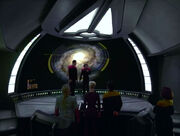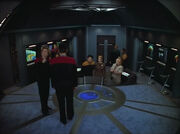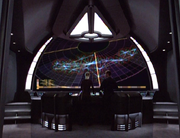m (fm) |
|||
| (4 intermediate revisions by 3 users not shown) | |||
| Line 11: | Line 11: | ||
''Enterprise'' NX-01 had an astrometrics section. In [[2153]], while preparing to survey a [[hypergiant]], {{dis|Captain|rank}} [[Jonathan Archer|Archer]] noted that astrometrics must be "chomping at the bit" to start their studies. While secretly visiting the [[cogenitor]] [[Charles]] aboard a [[Vissian starship]], working in the astrometrics lab was one cover story that [[Commander]] [[Charles Tucker III|Charles "Trip" Tucker]] told the [[Vissian]]s aboard the ship. ({{ENT|Cogenitor}}) |
''Enterprise'' NX-01 had an astrometrics section. In [[2153]], while preparing to survey a [[hypergiant]], {{dis|Captain|rank}} [[Jonathan Archer|Archer]] noted that astrometrics must be "chomping at the bit" to start their studies. While secretly visiting the [[cogenitor]] [[Charles]] aboard a [[Vissian starship]], working in the astrometrics lab was one cover story that [[Commander]] [[Charles Tucker III|Charles "Trip" Tucker]] told the [[Vissian]]s aboard the ship. ({{ENT|Cogenitor}}) |
||
| − | + | [[File:Astrometrics.jpg|thumb|left|The main screen of ''Voyager''{{'}}s astrometrics lab]] |
|
One particular example was the astrometrics lab on the {{USS|Voyager}}, which was designed by [[Ensign]] [[Harry Kim]] and [[Seven of Nine]]. Incorporating [[Borg]] technology, it could measure the [[radiation]] flux of up to three billion [[star]]s simultaneously, resulting in readings ten times more accurate than was previously possible. Astrometrics was used for charting [[star]]s, [[planet]]s, [[nebula]]e, and other stellar bodies and determine the ship's position relative to the [[galactic core]]. It contained a large, wraparound, [[hologram|holographic]] wall screen which could display a stellar region three-dimensionally. There were a series of control panels to manipulate the screen. The area below the screen and in front of the control panels could be used as a stage during presentations. Astrometrics also included three workstations on the side wall. The lab became Seven's primary workspace, where she mapped and catalogued interstellar bodies which the ship encountered. ({{VOY|Year of Hell}}) |
One particular example was the astrometrics lab on the {{USS|Voyager}}, which was designed by [[Ensign]] [[Harry Kim]] and [[Seven of Nine]]. Incorporating [[Borg]] technology, it could measure the [[radiation]] flux of up to three billion [[star]]s simultaneously, resulting in readings ten times more accurate than was previously possible. Astrometrics was used for charting [[star]]s, [[planet]]s, [[nebula]]e, and other stellar bodies and determine the ship's position relative to the [[galactic core]]. It contained a large, wraparound, [[hologram|holographic]] wall screen which could display a stellar region three-dimensionally. There were a series of control panels to manipulate the screen. The area below the screen and in front of the control panels could be used as a stage during presentations. Astrometrics also included three workstations on the side wall. The lab became Seven's primary workspace, where she mapped and catalogued interstellar bodies which the ship encountered. ({{VOY|Year of Hell}}) |
||
| − | [[File:Astrometrics |
+ | [[File:Astrometrics, 2374.jpg|thumb|Workstations in the astrometrics aboard ''Voyager'']] |
For convenience or advanced analysis, astrometrics could also be used for communications purposes or even as a workplace for easy access to sensor information. Astrometrics was used by the crew of ''Voyager'' to communicate with Earth, once contact was established through the [[Pathfinder Project]]. |
For convenience or advanced analysis, astrometrics could also be used for communications purposes or even as a workplace for easy access to sensor information. Astrometrics was used by the crew of ''Voyager'' to communicate with Earth, once contact was established through the [[Pathfinder Project]]. |
||
| + | [[File:Astrometrics lab.png|thumb|left|The astrometrics lab on ''Voyager'' as viewed from the door]] |
||
Kim and Seven updated ''Voyager''{{'}}s astrometrics lab at the request of [[Commander]] [[Chakotay]] in [[2374]]. According to Chakotay, the lab had not been updated since ''Voyager'' left [[spacedock]]. ({{VOY|Revulsion}}) |
Kim and Seven updated ''Voyager''{{'}}s astrometrics lab at the request of [[Commander]] [[Chakotay]] in [[2374]]. According to Chakotay, the lab had not been updated since ''Voyager'' left [[spacedock]]. ({{VOY|Revulsion}}) |
||
| Line 30: | Line 31: | ||
{{bginfo|While not stated in dialogue, the shooting script of ''Nemesis'' identified this location as the ship's astrometrics facility. ''{{st-minutiae|resources/scripts/nem.txt}}'' In {{film|8}}, astrometric readings and scans aboard the ''Enterprise''-E were done from the [[operations station]] on the [[bridge]].}} |
{{bginfo|While not stated in dialogue, the shooting script of ''Nemesis'' identified this location as the ship's astrometrics facility. ''{{st-minutiae|resources/scripts/nem.txt}}'' In {{film|8}}, astrometric readings and scans aboard the ''Enterprise''-E were done from the [[operations station]] on the [[bridge]].}} |
||
| − | == |
+ | == Appendices == |
| + | === Appearances === |
||
| + | <div class="appear"> |
||
| + | * {{ENT}} |
||
| + | ** {{e|Broken Bow}} (Season 1, mention only) |
||
| + | ** {{e|Fusion}} |
||
| + | ** {{e|Cogenitor}} (Season 2, mention only) |
||
| + | * {{VOY}} |
||
| + | ** {{e|Revulsion}} (Season 4, mention only) |
||
| + | ** {{e|Year of Hell}} |
||
| + | ** {{e|Year of Hell, Part II}} (mention only) |
||
| + | ** {{e|Concerning Flight}} |
||
| + | ** {{e|Mortal Coil}} |
||
| + | ** {{e|Message in a Bottle}} |
||
| + | ** {{e|Hunters}} |
||
| + | ** {{e|Prey}} (mention only) |
||
| + | ** {{e|Retrospect}} |
||
| + | ** {{e|The Omega Directive}} |
||
| + | ** {{e|Unforgettable}} |
||
| + | ** {{e|Demon}} |
||
| + | ** {{e|One}} |
||
| + | ** {{e|Hope and Fear}} |
||
| + | ** {{e|Night}} (Season 5) |
||
| + | ** {{e|Drone}} |
||
| + | ** {{e|Extreme Risk}} |
||
| + | ** {{e|In the Flesh}} |
||
| + | ** {{e|Once Upon a Time}} |
||
| + | ** {{e|Infinite Regress}} |
||
| + | ** {{e|Counterpoint}} |
||
| + | ** {{e|Latent Image}} |
||
| + | ** {{e|Bride of Chaotica!}} |
||
| + | ** {{e|Gravity}} |
||
| + | ** {{e|Bliss}} |
||
| + | ** {{e|Dark Frontier}} |
||
| + | ** {{e|The Disease}} |
||
| + | ** {{e|Course: Oblivion}} |
||
| + | ** {{e|The Fight}} |
||
| + | ** {{e|Think Tank}} |
||
| + | ** {{e|Juggernaut}} |
||
| + | ** {{e|Someone to Watch Over Me}} |
||
| + | ** {{e|11:59}} |
||
| + | ** {{e|Warhead}} |
||
| + | ** {{e|Equinox}} |
||
| + | ** {{e|Equinox, Part II}} (Season 6) |
||
| + | ** {{e|Survival Instinct}} |
||
| + | ** {{e|Tinker Tenor Doctor Spy}} |
||
| + | ** {{e|Alice}} |
||
| + | ** {{e|Riddles}} |
||
| + | ** {{e|Dragon's Teeth}} |
||
| + | ** {{e|One Small Step}} |
||
| + | ** {{e|The Voyager Conspiracy}} |
||
| + | ** {{e|Pathfinder}} |
||
| + | ** {{e|Fair Haven}} |
||
| + | ** {{e|Blink of an Eye}} |
||
| + | ** {{e|Virtuoso}} |
||
| + | ** {{e|Memorial}} |
||
| + | ** {{e|Tsunkatse}} |
||
| + | ** {{e|Collective}} |
||
| + | ** {{e|Ashes to Ashes}} |
||
| + | ** {{e|Child's Play}} |
||
| + | ** {{e|Good Shepherd}} |
||
| + | ** {{e|Life Line}} |
||
| + | ** {{e|The Haunting of Deck Twelve}} |
||
| + | ** {{e|Unimatrix Zero, Part II}} (Season 7) |
||
| + | ** {{e|Imperfection}} |
||
| + | ** {{e|Drive}} |
||
| + | ** {{e|Repression}} |
||
| + | ** {{e|Inside Man}} |
||
| + | ** {{e|Flesh and Blood}} |
||
| + | ** {{e|Shattered}} |
||
| + | ** {{e|Lineage}} |
||
| + | ** {{e|Repentance}} |
||
| + | ** {{e|Prophecy}} |
||
| + | ** {{e|The Void}} |
||
| + | ** {{e|Workforce}} |
||
| + | ** {{e|Human Error}} |
||
| + | ** {{e|Q2}} |
||
| + | ** {{e|Author, Author}} |
||
| + | ** {{e|Friendship One}} |
||
| + | ** {{e|Natural Law}} |
||
| + | ** {{e|Homestead}} |
||
| + | ** {{e|Renaissance Man}} |
||
| + | ** {{e|Endgame}} |
||
| + | </div> |
||
| + | |||
| + | === See also === |
||
| + | * [[Stellar cartography department]] |
||
| + | |||
| + | === External link === |
||
* {{mbeta}} |
* {{mbeta}} |
||
Revision as of 19:18, 4 October 2019
(covers information from several alternate timelines)
A Vulcan astrometrics lab in 2151
Astrometrics was a specialized lab used aboard starships and facilities for stellar cartographic purposes.
In the 22nd century, there was a powerful astrometric computer located in San Francisco. When Klaang was kidnapped from Enterprise NX-01 in 2151, Sub-Commander T'Pol suggested returning to Earth to make use of the computer in analyzing a spatial distortion registered by Enterprise's sensors. (ENT: "Broken Bow")
Later that year, a Vulcan astrometrics lab aboard the Vahklas-type Vahklas was used by T'Pol and Tolaris to study the Arachnid Nebula. The room contained a small statue of Surak, even though the ship was a V'tosh ka'tur vessel, and figured into a dream T'Pol experienced during the ship's visit to the nebula. (ENT: "Fusion")
Enterprise NX-01 had an astrometrics section. In 2153, while preparing to survey a hypergiant, Captain Archer noted that astrometrics must be "chomping at the bit" to start their studies. While secretly visiting the cogenitor Charles aboard a Vissian starship, working in the astrometrics lab was one cover story that Commander Charles "Trip" Tucker told the Vissians aboard the ship. (ENT: "Cogenitor")

The main screen of Voyager's astrometrics lab
One particular example was the astrometrics lab on the USS Voyager, which was designed by Ensign Harry Kim and Seven of Nine. Incorporating Borg technology, it could measure the radiation flux of up to three billion stars simultaneously, resulting in readings ten times more accurate than was previously possible. Astrometrics was used for charting stars, planets, nebulae, and other stellar bodies and determine the ship's position relative to the galactic core. It contained a large, wraparound, holographic wall screen which could display a stellar region three-dimensionally. There were a series of control panels to manipulate the screen. The area below the screen and in front of the control panels could be used as a stage during presentations. Astrometrics also included three workstations on the side wall. The lab became Seven's primary workspace, where she mapped and catalogued interstellar bodies which the ship encountered. (VOY: "Year of Hell")

Workstations in the astrometrics aboard Voyager
For convenience or advanced analysis, astrometrics could also be used for communications purposes or even as a workplace for easy access to sensor information. Astrometrics was used by the crew of Voyager to communicate with Earth, once contact was established through the Pathfinder Project.

The astrometrics lab on Voyager as viewed from the door
Kim and Seven updated Voyager's astrometrics lab at the request of Commander Chakotay in 2374. According to Chakotay, the lab had not been updated since Voyager left spacedock. (VOY: "Revulsion")
In 2375, when Seven suffered a type of multiple personality disorder, she took on the persona of Ferengi DaiMon Torrot and offered Captain Janeway twenty bars of latinum for the large astrometrics screen. (VOY: "Infinite Regress")
In an alternate timeline, Naomi Wildman and Icheb worked in astrometrics. (VOY: "Shattered")

Captain Picard and Data view an uplink from Starfleet Cartography
The USS Enterprise-E was equipped with an astrometrics lab in which a direct link with Starfleet Cartography could be established. Interference from nearby astronomical phenomena (such as the Bassen Rift) could interfere with the lab's link with Starfleet Cartography. Captain Picard and Lieutenant Commander Data utilized the lab to plot the Enterprise's rendezvous with Star Fleet Battle Group Omega in 2379. (Star Trek Nemesis)
Appendices
Appearances
- ENT:
- "Broken Bow" (Season 1, mention only)
- "Fusion"
- "Cogenitor" (Season 2, mention only)
- VOY:
- "Revulsion" (Season 4, mention only)
- "Year of Hell"
- "Year of Hell, Part II" (mention only)
- "Concerning Flight"
- "Mortal Coil"
- "Message in a Bottle"
- "Hunters"
- "Prey" (mention only)
- "Retrospect"
- "The Omega Directive"
- "Unforgettable"
- "Demon"
- "One"
- "Hope and Fear"
- "Night" (Season 5)
- "Drone"
- "Extreme Risk"
- "In the Flesh"
- "Once Upon a Time"
- "Infinite Regress"
- "Counterpoint"
- "Latent Image"
- "Bride of Chaotica!"
- "Gravity"
- "Bliss"
- "Dark Frontier"
- "The Disease"
- "Course: Oblivion"
- "The Fight"
- "Think Tank"
- "Juggernaut"
- "Someone to Watch Over Me"
- "11:59"
- "Warhead"
- "Equinox"
- "Equinox, Part II" (Season 6)
- "Survival Instinct"
- "Tinker Tenor Doctor Spy"
- "Alice"
- "Riddles"
- "Dragon's Teeth"
- "One Small Step"
- "The Voyager Conspiracy"
- "Pathfinder"
- "Fair Haven"
- "Blink of an Eye"
- "Virtuoso"
- "Memorial"
- "Tsunkatse"
- "Collective"
- "Ashes to Ashes"
- "Child's Play"
- "Good Shepherd"
- "Life Line"
- "The Haunting of Deck Twelve"
- "Unimatrix Zero, Part II" (Season 7)
- "Imperfection"
- "Drive"
- "Repression"
- "Inside Man"
- "Flesh and Blood"
- "Shattered"
- "Lineage"
- "Repentance"
- "Prophecy"
- "The Void"
- "Workforce"
- "Human Error"
- "Q2"
- "Author, Author"
- "Friendship One"
- "Natural Law"
- "Homestead"
- "Renaissance Man"
- "Endgame"
See also
External link
- Astrometrics at Memory Beta, the wiki for licensed Star Trek works
